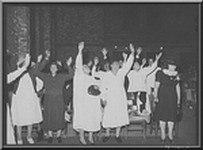

 Pentecostal and Charismatic–
Pentecostal and Charismatic–
What's the Difference?
Click on a question to go to the answer:
What is the origin of the word "Pentecost"?
What does the word "Pentecostal" mean in current common usage?
What does the word "charismatic" mean in general?
What does the word "Charismatic" imply in current common usage in religious circles?
What is the origin of the word Pentecost?
Pentecost is the English version of the name of a holy day of the Hebrew calendar. In Leviticus 23, God speaks through Moses of one of the days He commands the nation of Israel to observe annually as religious celebrations.
Lev 23:10-
10 "Speak to the Israelites and say to them: 'When you enter the land I am going to give you and you reap its harvest, bring to the priest a sheaf of the first grain you harvest.
He is to wave the sheaf before the LORD so it will be accepted on your behalf; the priest is to wave it on the day after the Sabbath…
This was traditionally done during the Days of Unleavened Bread, a week-
Lev. 23:15-
15 "'From the day after the Sabbath, the day you brought the sheaf of the wave offering, count off seven full weeks.
16 Count off fifty days up to the day after the seventh Sabbath, and then present an offering of new grain to the LORD.
From wherever you live, bring two loaves made of two-
21 On that same day you are to proclaim a sacred assembly and do no regular work. This is to be a lasting ordinance for the generations to come, wherever you live.
Note that this annual observance is to occur on the fiftieth day after the sheaf was waved during the Days of Unleavened Bread. By the time of Jesus' ministry on earth, the Greek name for this feast was Pentecost, which means in Greek fiftieth . English has borrowed this same word to designate this particular religious observance.
After His resurrection, Jesus appeared a number of times to His disciples over a period of forty days, and then was taken up to heaven. But just before that event, the following is recorded:
Acts 1:4-
4 On one occasion, while he was eating with them, he gave them this command: "Do not leave Jerusalem, but wait for the gift my Father promised, which you have heard me speak about.
5 For John baptized with water, but in a few days you will be baptized with the Holy Spirit."
6 So when they met together, they asked him, "Lord, are you at this time going to restore the kingdom to Israel?"
7 He said to them: "It is not for you to know the times or dates the Father has set by his own authority.
8 But you will receive power when the Holy Spirit comes on you; and you will be my witnesses in Jerusalem, and in all Judea and Samaria, and to the ends of the earth.
Acts 2 describes what happened in Jerusalem fifty days after the resurrection, on
the annual biblical Holy Day of Pentecost, to the Apostles and disciples of Jesus.
Note that these were all Jewish men and women, and that they would thus be observing
the annual day of Pentecost as they had throughout their whole lives. Also note in
the passage below that there were "God-
Acts 2:1-
1 When the day of Pentecost came, they were all together in one place.
2 Suddenly a sound like the blowing of a violent wind came from heaven and filled the whole house where they were sitting.
3 They saw what seemed to be tongues of fire that separated and came to rest on each of them.
4 All of them were filled with the Holy Spirit and began to speak in other tongues as the Spirit enabled them.
5 Now there were staying in Jerusalem God-
6 When they heard this sound, a crowd came together in bewilderment, because each one heard them speaking in his own language.
Acts 2:14-
14 Then Peter stood up with the Eleven, raised his voice and addressed the crowd: "Fellow Jews and all of you who live in Jerusalem, let me explain this to you; listen carefully to what I say.
15 These men are not drunk, as you suppose. It's only nine in the morning!
16 No, this is what was spoken by the prophet Joel:
17 "'In the last days, God says, I will pour out my Spirit on all people. Your sons and daughters will prophesy, your young men will see visions, your old men will dream dreams.
18 Even on my servants, both men and women, I will pour out my Spirit in those days, and they will prophesy.
Thus the word Pentecost is not just a “Christian theological word” that was invented to mean "the day on which the Holy Spirit was poured out" on the disciples who were the first Christians. Some Christians have used the phraseology, "We need another Pentecost" to indicate a repetition of the events or manifestations of that particular day described in Acts. But this is a poor choice of terms. The day of Pentecost is still observed annually by Jews, many Sabbatarian Christian groups which observe the annual Biblical holy days, and it has even been "adopted" into the Catholic and some Protestant annual liturgical calendars.
What does the word Pentecostal mean in current common usage?
To the average Christian, the Biblical significance of the word Pentecost has been
pulled from its Biblical roots, and has become a catch-
What does the word charismatic mean in general?
The word charismatic is derived from the Greek word charisma, which means gift. Thus
the word charismatic, even in non-
However, in religious circles the word charismatic is almost exclusively used in relationship to the following passage in the letter of Paul to the Corinthians:
1 Cor 12:1-
3 Now about spiritual gifts [from charisma], brothers, I do not want you to be ignorant…
4 There are different kinds of gifts, but the same Spirit.
5 There are different kinds of service, but the same Lord.
6 There are different kinds of working, but the same God works all of them in all men.
7 Now to each one the manifestation of the Spirit is given for the common good.
8 To one there is given through the Spirit the message of wisdom, to another the message of knowledge by means of the same Spirit,
9 to another faith by the same Spirit, to another gifts of healing by that one Spirit,
10 to another miraculous powers, to another prophecy, to another distinguishing between spirits, to another speaking in different kinds of tongues, and to still another the interpretation of tongues.
11 All these are the work of one and the same Spirit, and he gives them to each one, just as he determines.
This same concept of "spiritual gifts" also appears in Paul's letter to the Romans:
Rom 12:4-
4 Just as each of us has one body with many members, and these members do not all have the same function,
5 so in Christ we who are many form one body, and each member belongs to all the others.
6 We have different gifts, according to the grace given us. If a man's gift is prophesying, let him use it in proportion to his faith.
7 If it is serving, let him serve; if it is teaching, let him teach;
8 if it is encouraging, let him encourage; if it is contributing to the needs of others, let him give generously; if it is leadership, let him govern diligently; if it is showing mercy, let him do it cheerfully.
As is evident from the two passages above, a gift or charisma attributed to the empowerment of the Holy Spirit can include both obviously "supernatural" manifestations such as "prophesying" and "speaking in tongues" as well as less spectacular abilities such as teaching and showing mercy.
Most Christian groups would have no disagreement that many individuals among them have particular gifts—sometimes referred to as "talents." These may be "natural gifts" they seem to have been "born with." In addition, most groups will not dispute some such gifts may have been enhanced by God through the power of the Holy Spirit so that the person can use the gift more effectively to serve among the fellowship of Christians. But many such groups believe that the more "supernatural" of the gifts listed in Paul's letters, such as the gift of "speaking in tongues" or of "miraculous powers," are no longer to be expected as a natural part of the experience of Christians.
What does the word Charismatic imply in current common usage in religious circles?
The word Charismatic has come to be an adjective attached to those individuals and groups who disagree with the conclusion that the supernatural gifts of the spirit are no longer manifested in the world. Charismatics believe that all of the gifts are still available to the Christian community. In fact, the term Charismatic usually implies in particular those "supernatural" gifts—sometimes called "sign gifts," as they are viewed as a outward "sign" of the power of the Holy Spirit—such as "speaking in tongues" and "prophecy" and "discernment of spirits."
What similarities and differences are there in the common implications of the words Pentecostal and Charismatic in current common usage?
The history of the religious movements designated popularly by the terms Pentecostal and Charismatic is chronicled elsewhere on this site. For details, consult that description. Briefly, the earliest groups in the modern resurgence of interest in the supernatural manifestations of Acts 2, which began forming around the turn of the last century (1900), referred to themselves as Pentecostal. Their particular emphasis was on restoration of the gift of tongues as an outward sign of what they referred to as the "baptism of the Holy Ghost." Up until the 1950s, this movement was on the fringes of religion in modern society. The few denominations which espoused this doctrine were not part of the mainstream of religious groups.
Beginning in about 1960, interest in the Biblical concept of "spiritual gifts," including "speaking in tongues," began spreading to individuals and congregations which had historically been in the mainstream, including the Roman Catholic Church and many Protestant groups. Rather than align themselves with the Pentecostal groups which had been around for fifty years or more, they preferred to refer to themselves as a Charismatic renewal within their own denominations. Even when some found themselves at odds with those in their old denominations which resisted this renewal, and were forced to form new outside groups, most preferred to retain the designation Charismatic.
Specifically in the matter of "speaking in tongues," a number of groups (but not all) which are historically defined as Pentecostal have made this manifestation an absolute prerequisite to salvation. They do not view it as merely one of the spiritual gifts which may be given to a Christian. They believe it to be the "sign" of conversion. On the other hand, most Charismatic groups believe that it is the privilege of all Christians to speak in tongues, but it is a gift which is given subsequent to the conversion experience. Thus a person who has not yet spoken in tongues but who has professed Christ, and perhaps even been baptized in water, would still be considered a brother or sister in Christ.
Are there other variations on the meaning of the word Charismatic as it is used by some in general conversation?
Most Charismatic groups have a tendency to have worship services which are lively and quite interactive. Rather than just a message by one designated pastor, a variety of participants may contribute words of encouragement, prayer requests, praise reports, "prophetic words" they believe to have been inspired on the spot by God, and so on. The music that many Charismatic congregations use for praise and worship may be loud and enthusiastic and very rhythmic at times, with an emphasis on contemporary music rather than the historical hymns of the more formal religious denominations.
Thus many people tend to use the term Charismatic to designate a religious setting in which music is lively, or in which many members of the congregation may contribute to the service. However, this is not really an accurate use of the term. Many groups which play lively contemporary music, and which have less formal services, do not emphasize the "supernatural gifts" at all, and would be surprised if someone interrupted their service with a "message in tongues" or a "prophecy."
How are the words Pentecostal, Charismatic and Hyper-
The typical use of Pentecostal on this site is in reference to the historical groups that began in the early 1900s which emphasized speaking in tongues as the evidence of the "baptism of the Holy Ghost."
The typical use of Charismatic on this site is in reference to groups which arose from 1960 and on (or earlier groups, such as the Assemblies of God, which shifted their emphasis around that time) which believe they have manifestations among them of the more "supernatural" of the "spiritual gifts" described in the Bible. The word Charismatic will be capitalized when used in this way to distinguish it from the general use of the term to just mean a "gifted person" outside a religious setting.
The term Hyper-
Unless otherwise noted, all original material on this Field Guide website
is © 2001-
Careful effort has been made to give credit as clearly as possible to any specific material quoted or ideas extensively adapted from any one resource. Corrections and clarifications regarding citations for any source material are welcome, and will be promptly added to any sections which are found to be inadequately documented as to source.